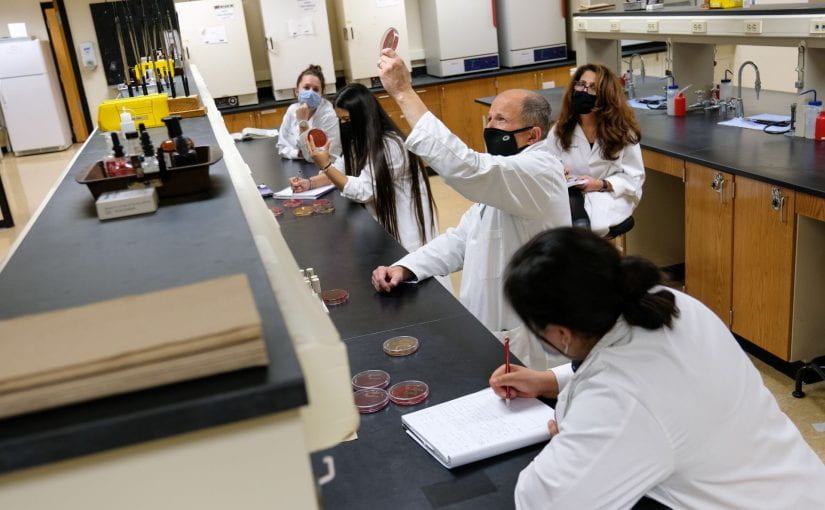Imagine being in high school and having the ability to conduct research and contribute to a global science project. That’s what some students from Green Bay West High School had the opportunity to do earlier this school year as part of the Tiny Earth project.
Tiny Earth provides students with the opportunity to help find a solution to a pressing science concern: the diminishing supply of effective antibiotics. Through the program, students study microbes looking for antibiotics from soil bacteria in their own backyards. At the end of the project, students report their findings, which are loaded into an international database.

“Students are part of international research that’s focused on the crisis of finding new antibiotics — that’s an exciting project to be part of,” said Brian Merkel, an associate professor in Human Biology at the University of Wisconsin-Green Bay, who attended training at the Wisconsin Institute for Discovery to lead the college’s Tiny Earth project. College juniors and seniors usually participate.
“Tiny Earth is a true, ongoing research project that turns students into researchers,” he said.
Thanks to charitable support from two Green Bay area business leaders, the Tiny Earth program expanded to include these future-minded contenders who were able to conduct research at the college level. Last summer, the six students attended two weeks of intensive training. After that, the students conducted research and began working on their final projects at the University every Wednesday for 14 weeks leading up to Tiny Earth.
The students also were part of Serious About STEM at Green Bay

West, founded by Lisa Merkel and Bonnie Gonzales, which targets first generation college students.
“The key to success was to find funding for free transportation and food for the girls — removing barriers that may have kept them from participating,” she said. “Students gained confidence through the program, knowing that they’re a high school student doing the same work as college juniors and seniors.”
Stephanie Long and Andy Hetzel Jr., owners of FyterTech Nonwovens LLC in De Pere, liked the idea of putting students in new situations where they might not have pictured themselves before and supported expansion of the program.
“This program was right in my wheelhouse. It builds confidence and gives the girls thoughts about different jobs,” Long said.
“I’ve seen some videos of the girls and it’s exciting to see them exposed to something so new to them.”
Tiny Earth also exposes students to the variety of STEM careers available, Lisa Merkel said.
“We want to help keep them moving forward,” she said. “A girl told me when she first walked into the lab, she didn’t know anything about the space, but now she feels like she owns this. That was so great to hear.”
Brian Merkel said he knew the program expansion would start small and “we plan to take what we learned this year and help the program continue to grow. It’s such valuable global research and we have students here participating, which is cool.”
